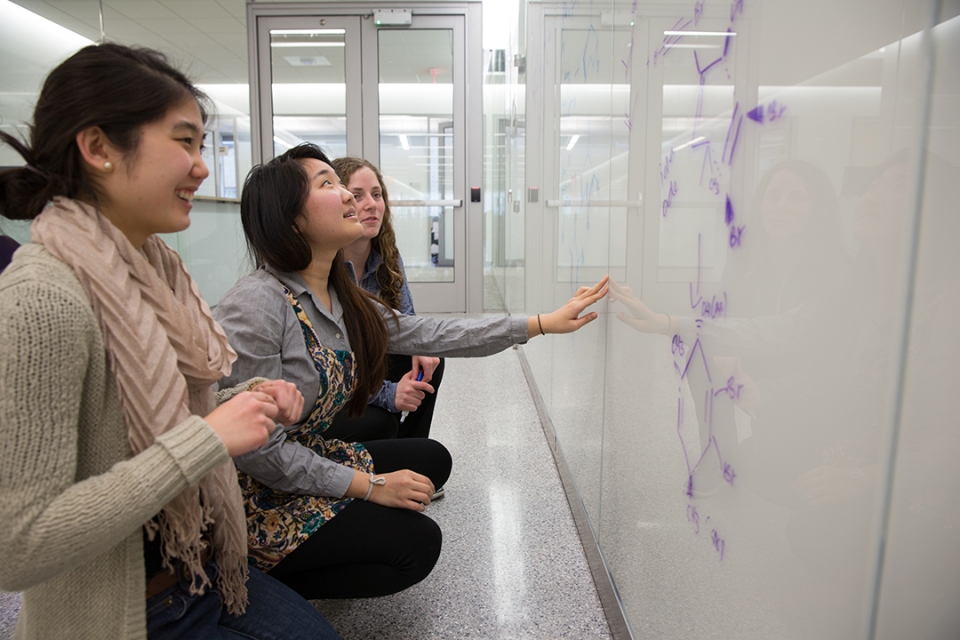Eight undergraduate women studying in the School of Engineering and Applied Science will conduct research under faculty mentors as part of a program focused on supporting women in science, engineering and mathematics.
George Washington University was recently awarded a $300,000 Clare Boothe Luce Program Undergraduate Research grant, which provides funding for promising female students in science, engineering and mathematics fields. The award will enable students to pursue research with guidance from faculty mentors, hone their professional skills and establish themselves as university leaders.
Women are discouraged from pursuing careers in science, technology, engineering and mathematics (STEM) fields, long before they reach college, said Rachelle Heller, a SEAS professor and former associate provost who will serve as academic lead for GW’s Clare Boothe Luce Research Scholars Program.
Girls face adversity entering these fields and lose interest in them over time due to social factors, lack of confidence and few role models, Dr. Heller said. Doing research will help women who have continued engineering programs into their sophomore year pursue competitive graduate programs and move into the profession.
“What we know about having a diverse pool is there is a leaky pipeline. It is not hemorrhaging anywhere, but it is leaking at every joint,” Dr. Heller said. “Women in the middle of their sophomore year, who have persevered, even if their confidence is waning, they’re still here. What this does, in my opinion, is it jump starts their confidence again.”
SEAS sophomores can apply for this program in early 2018 and must propose a research project that has been signed off on by a GW faculty mentor in their application. The first cohort of four GW students will start their research this summer, immediately after spring semester ends and continue through spring 2020. The second cohort of four students will start the project in summer 2019 and finish in spring 2021, which gives the two groups nearly a year of overlap. Each student will receive $37,500 total for two years.
Undergraduates have the chance to learn technical skills doing research, but they will also gain resilience, self-discipline and other traits that will serve them well in the future, Dr. Heller said.
Students will write blog posts about their research several times throughout the program, travel with their mentors to a conference or meeting and present their work at the annual SEAS Student Research and Development Showcase and the university-wide GW Research Days. They will also pay it forward by speaking to local students at the Washington School for Girls and acting as role models.
Establishing a pipeline of role models is an important service to the field, Dr. Heller said.
“If I’m in high school or even junior high and a college sophomore comes and talks to me, I can see myself getting there. That’s not a bridge too far. We call those near peers,” she said. “Having this connection with near peers is an important piece. It’s important for the scholarship winners but it’s really important for the students who hear them.”
SEAS is committed to advancing opportunities for women in science and engineering and helping them succeed in school and beyond. SEAS actively recruits women and focuses on retention efforts, mentorship and training programs. The school ranked fifth nationally in 2015 for the percentage of bachelor of science degrees that it awarded to women.
Forty-one percent of SEAS students enrolled during the 2015-16 academic year were women, an increase from 36 percent in the 2004-2005 academic year. After finishing their undergraduate degrees, many of these women go on to science and engineering graduate programs at respected research institutions.
“The Clare Boothe Luce research scholarships come at a time when SEAS has really begun to hit its stride in recruiting and retaining women, thanks in part to Dr. Heller’s long term commitment and contributions to this goal,” said David Dolling, dean of SEAS. “We’ve been growing the fraction of women students in our programs for some time, and these scholarships are both a testament and a boost to our efforts. By creating opportunities for our women students to engage in exciting research projects across the school, the scholarships will be particularly helpful with retention.”


